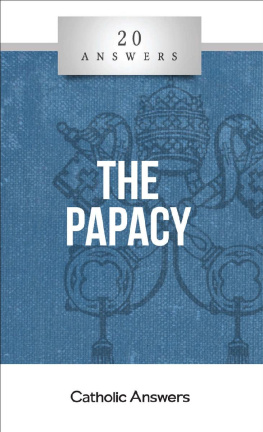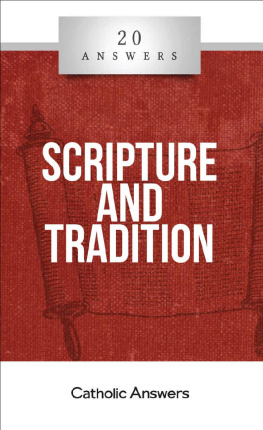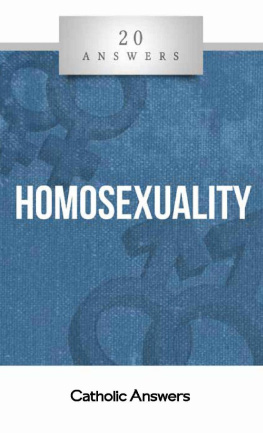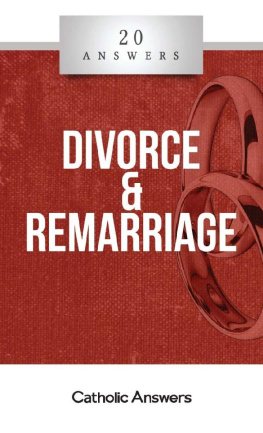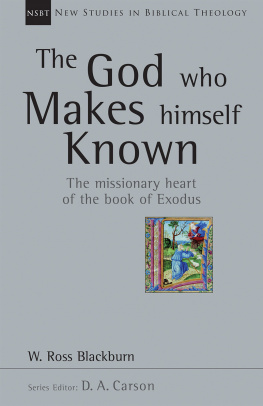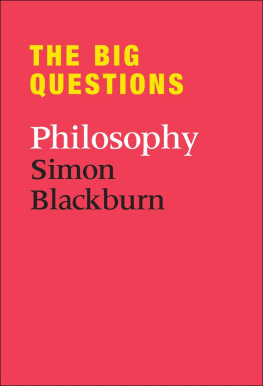Jim Blackburn - 20 Answers- The Papacy
Here you can read online Jim Blackburn - 20 Answers- The Papacy full text of the book (entire story) in english for free. Download pdf and epub, get meaning, cover and reviews about this ebook. year: 2016, publisher: Catholic Answers Press, genre: Religion. Description of the work, (preface) as well as reviews are available. Best literature library LitArk.com created for fans of good reading and offers a wide selection of genres:
Romance novel
Science fiction
Adventure
Detective
Science
History
Home and family
Prose
Art
Politics
Computer
Non-fiction
Religion
Business
Children
Humor
Choose a favorite category and find really read worthwhile books. Enjoy immersion in the world of imagination, feel the emotions of the characters or learn something new for yourself, make an fascinating discovery.
- Book:20 Answers- The Papacy
- Author:
- Publisher:Catholic Answers Press
- Genre:
- Year:2016
- Rating:5 / 5
- Favourites:Add to favourites
- Your mark:
- 100
- 1
- 2
- 3
- 4
- 5
20 Answers- The Papacy: summary, description and annotation
We offer to read an annotation, description, summary or preface (depends on what the author of the book "20 Answers- The Papacy" wrote himself). If you haven't found the necessary information about the book — write in the comments, we will try to find it.
20 Answers- The Papacy — read online for free the complete book (whole text) full work
Below is the text of the book, divided by pages. System saving the place of the last page read, allows you to conveniently read the book "20 Answers- The Papacy" online for free, without having to search again every time where you left off. Put a bookmark, and you can go to the page where you finished reading at any time.
Font size:
Interval:
Bookmark:
20 Answers
The Papacy
Jim Blackburn

20 Answers: The Papacy
Jim Blackburn
2015 Catholic Answers
All rights reserved. Except for quotations, no part of this book may be reproduced or transmitted in any form or by any means, electronic or mechanical, including photocopying, recording, uploading to the Internet, or by any information storage and retrieval system, without written permission from the publisher.
Published by Catholic Answers, Inc.
2020 Gillespie Way
El Cajon, California 92020
1-888-291-8000 orders
619-387-0042 fax
catholic.com
Printed in the United States of America
978-1-941663-32-5
978-1-941663-33-2 Kindle
978-1-941663-34-9 ePub
Table of Contents
Introduction
When St. Paul evangelized in Antioch, a dispute arose among the disciples there about whether or not Gentile converts to Christianity needed to keep the Mosaic Law. Jewish converts in the community unnecessarily continued to follow precepts of the old law and they expected Gentile converts to do the same. In Acts 15, Luke relates the story of how Paul went about settling this dispute: he took the matter to the most authoritative teacher of the Faith, Peter, and the apostles in communion with him. This made perfect sense, as Jesus had long ago singled out Peter as head of the apostles, giving him unique authority in the Church (see Matt. 16:1819).
Down through the centuries, there have been twenty-one ecumenical councils at which the apostles successors have met under the authority of Peters successor to definitively settle matters of faith and morals. Peters successorthe pope, as he has come to be knowncontinues to be recognized as the highest teaching authority in the Church. At least this is the case for Catholicsnot so among other Christians.
Unfortunately, this rejection of papal authority has resulted in widespread disunity among Christians throughout the world. Literally thousands of Christian denominations have arisen in just the last 500 years since the advent of Protestantism. Such division is a terrible breakdown in the oneness that Jesus intended his followers to maintain (see John 17:2022).
Christs followers today are splintered in so many directions that the Catholic Church itselfthe one Church founded by Christis often mistaken among the many other Christian communities throughout the world as simply another denomination. Disputes outside the Church over matters of faith and morals are either settled according to the fallible judgment of denomination leaders or they result in further splintering into yet countless additional sects.
Outside the Christian community, as modern culture increasingly bucks authority, the papacy has become a target of disdain. The moral decay of society is considered progress, while the constant teachings of the Catholic Church are viewed as anything from archaic and oppressive to hateful and bigoted. The pope is a favorite bulls-eye for such attacks.
Considering the vast misunderstanding ofand disrespect towardthe papacy today, many questions need to be addressed in defense of this sacred office instituted by Christ. It is my hope that this booklet will, in however small a way, be a useful instrument in explaining and defending the papacy among the challenges it faces in the world today. In doing so, may it especially foster unity among the Christian faithful as one flock under one shepherd (John 10:16).
1. What is the papacy?
The papacy is the office and jurisdiction of the pope as the head of Christs Church on earth. The English word papacy translates from the Latin word papatus , which derives from the Latin word papa, from which we get pope. Going back even further, the Latin term papa comes from the Greek word papas, which means father. In a real sense, the pope is like a father (that is, papa) to the Christian faithful.
Other terms refer to the pope in his office of the papacy as well. Some examples are bishop of Rome, Peters successor, Roman pontiff, and vicar of Christ. As the head of Christs Church on earth, the pope is responsible for seeing that the bishops and their flocks throughout the world are unified, just as Jesus prayed for at the Last Supper (John 17:911):
I am praying for them; I am not praying for the world, but for those whom thou hast given me, for they are thine; all mine are thine, and thine are mine, and I am glorified in them. And now I am no more in the world, but they are in the world, and I am coming to thee. Holy Father, keep them in thy name, which thou hast given me; that they may be one, even as we are one.Jesus founded one Church to endure until he comes again: I will build my church, and the powers of death shall not prevail against it (Matt. 16:18). He uniquely empowered the papacy, with Peter as the first pope, to help ensure the unity of his one Church. The Catechism of the Catholic Church (CCC) explains further:
The pope , bishop of Rome and Peters successor, is the perpetual and visible source and foundation of the unity both of the bishops and of the whole company of the faithful. For the Roman Pontiff, by reason of his office as Vicar of Christ, and as pastor of the entire Church has full, supreme, and universal power over the whole Church, a power which he can always exercise unhindered. (CCC 882)The Church recognizes that this authority comes from God: The pope enjoys, by divine institution, supreme, full, immediate, and universal power in the care of souls (CCC 937).
At the time of this writing, Pope Francis is the current pope. St. Peter was the first pope and there have been a total of 267 down through the history of the Church. This is not a fact that must be taken on faith; as we will see, it is documented historically.
No other church can lay claim to the unique leadership with which Jesus endowed his one true Church, the Catholic Church, for the sake of unity in doctrine and practice.
2. Why does the Church need the papacy? Cant we just follow Jesus?
In order for Christs Church to be unified as he prayed it would be, Jesus established a hierarchical authority with one person at the head, so that we could be sure that in following that person we would be following him. It makes sense for there to be such a single authority overseeing the Church throughout the world; to govern it, sanctify it, and perhaps most importantly, to ensure that it continue to teach Christs truth in its fullness, free from corruption, down through the ages. This teaching authority is called the Magisterium , and it comprises the pope (at its head) and all the bishops in communion with him.
In the first century St. Peter wrote, There are some things in [Pauls letters] hard to understand, which the ignorant and unstable twist to their own destruction, as they do the other scriptures (2 Pet. 3:16). Here we see that even during the apostolic age there was concern about misguided interpretations of Scripture. Sacred Tradition could easily be corrupted as well. Peter went on to warn Christians, You therefore, beloved, knowing this beforehand, beware lest you be carried away with the error of lawless men and lose your own stability (2 Pet. 3:17).
How were early Christians to know who was teaching the truth? Not all the many different interpretations of Scripture and prophecies they were hearing could be correct. There must have been some way that they could discern who was teaching Christs truth and who was misguiding them. Of course, this is why Jesus gave certain disciples authority to teach in his name. The early Christians knew they could trust Peters teaching because he was the head of Jesus apostles, those disciples who Jesus first appointed with everlasting authority to teach.
Next pageFont size:
Interval:
Bookmark:
Similar books «20 Answers- The Papacy»
Look at similar books to 20 Answers- The Papacy. We have selected literature similar in name and meaning in the hope of providing readers with more options to find new, interesting, not yet read works.
Discussion, reviews of the book 20 Answers- The Papacy and just readers' own opinions. Leave your comments, write what you think about the work, its meaning or the main characters. Specify what exactly you liked and what you didn't like, and why you think so.

